The Importance of Remembering to Use an Anonymous Burner Phone

In the US you need valid ID to buy Sudafed and related decongestants because they can be used to make crystal meth. You need an ID to buy large amounts of nail polish remover because it can be used to make explosives. But no ID is needed for cell phones. The lack of routine data on cellphones that would be available in other countries has resulted in DEA buying from AT&T access to the Hemisphere database that “covers every call that passes through an AT&T switch — not just those made by AT&T customers — and includes calls dating back 26 years”. So this policy does not protect privacy, it leads to more invasive law enforcement invasions of privacy.
For many years Tracfone was the largest provider of burner phones, perhaps it still is. Like all providers Tracfone requires some registration before a newly purchased burner can be used. But making up false names for dozens of burners can be such a pain so Tracfone allowed a shortcut for that market segment. See the last line in the signup form that used to be on Tracfone's website? "If you wish to skip this step, please click here"
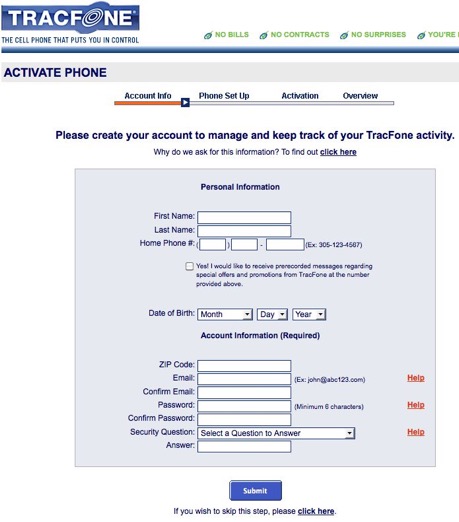
(Formerly on Tracfone website)
But now Tracfone and others require you to at least make up a false name and address. Oh, for the good old days!
But "Affluenza" teen Ethan Couch, shown above, was apparently not as smart as your average drug dealer. He should have studied Breaking Bad more carefully! CNN reports that he was tracked down based on use of his cell phone. Ethan, making up false names and entering them on carriers' websites takes time, but it is worth it. Be thankful this is the USA. No one in the US requires ID to purchase even dozens of cell phones as opposed to Sudaphed and nail polish remover. Indeed, while Title VII of the USA PATRIOT Improvement and Reauthorization Act of 2005, P.L. 109-177 limits the amount of Sudafed you can purchase, there is no limit to how many cell phones you can buy at a time in the USA. Ethan, you should have stocked up on your way to Mexico!
But, Ethan, when you get back into a US prison you can be certain that genuine burner phones will be there for your use. They are the contraband phone technology of choice for incarcerated criminals! And since FCC is moving at a glacial pace in Docket 13-111, not to mention the petition filed by a large group of state corrections officials more than 6 years ago in July 2009, the burner phones you find there will probably work well. Even in isolated rural maximum security prisons the cell phone industry has convinced FCC than only a "silver bullet"-like quixotic technology yet to be finalized poses a low enough risk to their service that FCC could allow it to disrupt prisoners from running criminal enterprises or ordering murders of witnesses. (At least CTIA has removed from its website a video from a former high ranking official there that claimed, based on an incident in Brazil, that any prison cell phone jamming could disrupt cell phone services miles away!)
We sincerely hope that there is never a cellphone-activated IED attack on US soil. But we are certain that if this were to ever happen that the types of political forces that prompted the original PATRIOT Act would promptly require draconian limits on "burner"/prepaid phones. We hope that the FCC and the cellular industry have a rational contingency plan for doing this so that legitimate uses of prepaid phones by millions of users is not disrupted by the antisocial uses that the industry now condones. And if you have such a plan, why not phase it in now?
UPDATE
Lest you think I was too hard on Tracfone above, here is the first paragraph of Sean Penn's "El Chapo Speaks:A secret visit with the most wanted man in the world" from Rolling Stone:
It's September 28th, 2015. My head is swimming, labeling TracPhones (burners), one per contact, one per day, destroy, burn, buy, balancing levels of encryption, mirroring through Blackphones, anonymous e-mail addresses, unsent messages accessed in draft form. It's a clandestine horror show for the single most technologically illiterate man left standing.
(The spelling of "TracPhones" in the article says something about Rolling Stone's attention to detail which might also explain their mess with their UVA article on the fraternity party. But it is clear which carrier they are talking about.)
As Docket 13-111 Lingers Without Resolution, Comm. Pai Tries to Focus Attention on Prison/Cell Phone Crisis
Sobering meeting w/ corrections officials at Georgia prison about serious, growing problem of contraband cellphones. pic.twitter.com/Xbw3SRBCjm
— Ajit Pai (@AjitPaiFCC) October 16, 2015FCC Commissioner @AjitPaiFCC visited Georgia today to learn about the problem of cellphones in prisons. http://t.co/xI9eZq4c79 (from @AP)
— Kate Brumback (@katebrumback) October 15, 2015.@GA_Corrections: on pace to confiscate >8K contraband cellphones this year. Used to place hits, run scams, more. http://t.co/z8Ks8wgqq6
— Ajit Pai (@AjitPaiFCC) October 16, 2015Long time readers will recall that the issue of contraband cell phone use in prisons and countermeasures for dealing with them have been a recurring topic here, even if it is one that the cellular industry thinks should be buried. In general, communication should enhance life and usually does. But large scale use of contraband phones by incarcerated criminals actually threatens life!
Independent FCC action, championed by Comm. Clyburn, has reduced the cost of authorized legitimate pay phone services from prisoners to their families and has somewhat decreased the demand for contraband phones. On May 1, 2013, FCC released the NPRM in Docket 13-111 "to facilitate the development of multiple technological solutions to combat the use of contraband wireless devices in correctional facilities nationwide." This was almost 4 years after the filing of a petition for rulemaking by the South Carolina Department of Corrections and dozens of other state and local corrections agencies that apparently was consigned the FCC's secret petition black hole where it lingered in a corner of ECFS that was unknown to all but a few FCC insiders!
But as the cellular industry demands major changes for US spectrum policy to satisfy their endless appetite for spectrum below 6 GHz - they have only token interest in higher frequencies as can be seen in their minimal comments to FCC and participation in WRC preparation related to higher bands - as the cellular industry demands the lion's share of FCC's ever shrinking resources, they seem to have little or no interest in dealing decisively with this deadly unintended consequence of their present services. They have sent the underfunded and understaffed state and local prison administrators on a quixotic chase of the "holy grail": "managed access" which will solve the technical problem of illicit cellphone use in prisons with zero impact on the carriers' business plans. Indeed, they deny that this will result in any over coverage while at the same time insist that jamming will always results in over coverage. WOW - responsive physics!
In their most recent ex parte meeting with FCC staff in December, CTIA and carrier representatives pressed for "the need for a court order to terminate service to a contraband device" presumably under all circumstances including prisons in remote areas. Contrast this with the views of the American Corrections Association which ask to simplify the disconnect process, require carrier participation in managed access system if requested by prisons, and allow jamming in the location where it is technically possible due to remote locations.
But meanwhile nothing is being resolved at FCC in this life or death matter. Kudos to Comm. Pai for making an onsite visit to learn about the problem. We hope that FCC's delays in this urgent matter, now that 6 years have passed since the South Carolina petition, will soon end.
The Societal Cost of Unrestricted Sale of Burner Phones
However, if at the same Walmart you want to buy Sudafed you will find that the law allows for the sale of pseudoephedrine only from locked cabinets or behind the counter. The law also:
- limits the monthly amount any individual could purchase
- requires individuals to present photo identification to purchase such medications
- requires retailers to keep personal information about these customers for at least two years after the purchase of these medicines.
As we wrote last month, CVS is voluntarily beginning to limit - not forbid - sales of nail polish remover because the acetone in it is also key to the crystal meth production process. However there is no sign that they are limiting sales of “burner” phones.
In its reply comments to Docket 13-111 on wireless devices in prisons, Verizon Wireless commented on “brier” phone restriction issue. This is the first time we are aware that CTIA or any of its major members has publicly addressed the feasibility of restricting sales of “burner” phones. VZW told FCC:
One commenter suggested that the Commission consider placing requirements on the type of information and the validity of information carriers obtain in providing service to customers purchasing prepaid devices. MSS Comments at 13-14. See also Indiana Department of Corrections Comments, GN Docket No. 13-111, filed July 17, 2013 (“Indiana DOC Comments”) at 1 (questioning whether selling such devices to anonymous persons is desirable public policy). While MSS acknowledges the legitimate need of some users, such as battered spouses, to obtain such devices anonymously, it urges the Commission to consider requiring identification validation for at least some purchasers of prepaid devices. Given that such a requirement would necessarily impact users other than contraband device users, this suggestion is beyond the scope of this proceeding and should not be considered in this docket.
So VZW feels that since restrictions might impact some legitimate users, we should not even think about restrictions that may have a balance of pluses and minuses. As can be seen in the picture at right, VZW at one time even used vending machines to sell “burner” phones! If Congress had similarly thought that the need of the public to buy Sudafed outweighed the benefits of preventing deaths through methamphetamine abuse, then we would not have the “burdens” we face in buying Sudafed today. Had only the Sudafed makers been represented by CTIA we might be able to find Sudafed vending machines on street corners for the convenience of those with a late night case of a runny nose!
But a September 1 NY Times article entitled “Drug Agents Use Vast Phone Trove, Eclipsing N.S.A.’s” reveals another cost of the unrestricted sale of burner phones. The article describes how AT&T sells to DEA access to “Hemisphere” - a huge database of “metadata” about the phone calls of Americans. As opposed to the NSA database, Hemisphere “covers every call that passes through an AT&T switch — not just those made by AT&T customers — and includes calls dating back 26 years”.
Why does DEA needs such a comprehensive, and no doubt costly system? The article goes on to say:
The Obama administration acknowledged the extraordinary scale of the Hemisphere database and the unusual embedding of AT&T employees in government drug units in three states.But they said the project, which has proved especially useful in finding criminals who discard cellphones frequently to thwart government tracking, employed routine investigative procedures used in criminal cases for decades and posed no novel privacy issues. (Emphasis added.)
Thus because the cellular industry is not willing to consider any compromise to the unrestricted sale of “burner” phones we must live with a large invasion of privacy by DEA and its state and local partners and the potential abuse of this information. It appears that AT&T has even turned this into a new secret, but presumably profitable, product line!
Wouldn’t modest regulations on “burner” phone sales, perhaps similar to the above stated DEA rules on Sudafed sales, be a more reasonable balance of public interests? If there is ever a cell phone triggered IED incident in the US, there will be a large outcry for such regulation and the outcome will not be as moderate and balanced as what would be feasible today in a less frantic atmosphere. We urge the initiation of a deliberate dialogue on this topic to balance all legitimate needs. Do we really need unrestricted sales of bags full of anonymous prepaid “burner” phones?
Prison Cellphone Reply Comments Date Extended
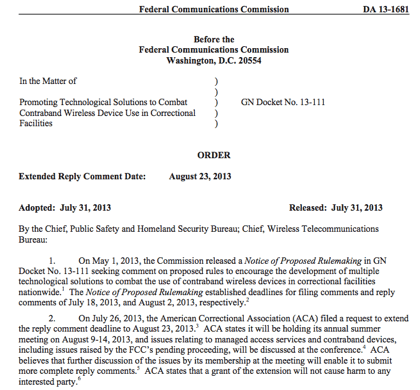
In the above order from FCC, the reply comment date for the cellphones in prison rulemaking, Docket 13-111, has been extended to August 23, 2013.
There is a lot to comment on:
- AT&T objects to requiring a carrier to terminate service to a cell phone identified being in a prison saying it will only do so with an order from FCC or a court. (Perhaps FCC could set up a website and “rubber stamp” all requests from approved prison administrators and then forward the request to AT&T?)
- Boeing states that FCC could authorize managed access in cellular spectrum “without a spectrum lease agreement” and that “reliance on lease agreements to authorize managed access systems could create undesirable precedent” (Most other commenters just believe FCC should simplify leasing and, except for MSS comments, do not suggest that leasing should be mandatory or should be on reasonable terms.)
- CTIA believes that mandatory service termination of cell phones operating in prisons can not be authorized unless FCC “adopt(s) clear, standardized requirements that apply to all cell detection systems” - a clear multiyear delay unless CTIA wants to be helpful -- as opposed to be obstructive.
- Verizon thinks service termination requests should require a court order. Heck, AT&T is more open minded and is willing to consider a request from FCC! (Sprint & T-Mo have not commented as yet.)
- NTCH, Inc. (a regional CMRS carrier that offers service under the trade name CLEAR TALK) says FCC “should declare the confines of prisons, including surrounding lands owned or controlled by the prison system, to be ‘quiet zones’ akin to the Commission's treatment of radio astronomy and other research facilities designated by the Commission…A corrections department could only declare a site a quiet zone in connection with its designation of one or more entities that would bear the expense and take the responsibility of preventing unauthorized transmissions in the prison confines and would also be in a position to offer service over authorized frequencies in the prison area…Once designated as the Prison Service Provider, the Provider would be authorized to prevent or create interference to any unauthorized transmissions from within the prison confines (including the buffer zone described below) because no such transmissions would be lawful under the terms of the licenses pursuant to which the offending cell phones would normally be operating…This plan relies on well-known quiet zone protection principles but extends not just to astronomical observations but to measures which directly protect human health and safety. The modest diminution in rights which the cellular carriers would experience under this plan is far outweighed by the benefits to the public which would result.”
- All the comments can be found at http://apps.fcc.gov/ecfs/proceeding/view?name=13-111.
vox populi, vox dei
Comments in Cellphone/Prison Rulemaking (Docket 13-111)

Carl Lackl, Jr. (l) a Baltimore witness murdered as a result of a prison cell phone call.
Capt. Robert Johnson (r) South Carolina Department of Corrections, shot 6 times
at his home as a result of a prison cell phone call.
Your blogger has filed comments in Docket 13-111, which deals with “Promoting Technological Solutions to Combat Contraband Wireless Device Use in Correctional Faciliteis (sic)”. These comments were on behalf of MSS, not for any previous or current client and were made solely in the public interest. At 34 pages without attachments they happen to be the longest filing to date, although length does not necessarily imply quality or success. So far, the docket file has 43 items from outside FCC, mostly comments
The comments start with the above photos of Carl Lackl, Jr. and Captain Robert Johnson to remind readers that unlike virtually all FCC proceedings, this one does not deal with just economic benefits for one party versus another, but rather an unintended side effect of today’s CMRS technology in which real people die.
The comments review the unusual history of this proceeding including multiple petitions that sat in “petition limbo” for years even though some were from local governments and even though Section 1.403 of the FCC’s own rules requires that such petitions be assigned a file number and “promptly “ be included on a public notice for comment. In particular, the MSS comments include as attachments parts of the 2010 GTL petition that have never been commented on that deal with mandates needed to make managed access effective in all cases and which give alternative theories that would permit the Commission the discretion to authorize jamming in special cases if it was found to be in the public interest. Cellular interests cling to an interpretation of Section 333 of the Communications Act that has never been endorsed by the FCC or a court that says FCC lacks jurisdiction to authorize jamming but NTIA has such jurisdiction for federal users.
MSS urges the Commission to require all CMRS carriers to provide the spectrum under reasonable terms needed for MAS if requested by a prison. While today’s major carriers do so and promise to pressure smaller carriers, the reality is no one knows what firms will be CMRS carriers in rural areas next year since many spectrum auctions are pending to implement the spectrum demands of cellular interests. MSS also urges the Commission to require mandatory a priori coordination of all technical changes to the cellular network near prisons with MAS systems in order to maintain the functioning of MAS throughout the network evolution.
The comments emphasize that cell phones in prisons is a complex issue and that no “magic bullet” is likely to be found that eliminates the whole problem without causing side effects. While cellular interests claim jamming would inevitably cause “overjamming” that impacts users outside prisons (see CTIA video) , their preferred “managed access systems”/MAS will also cause excess coverage in prisons that do not have an adequate buffer from publicly accessible areas, such as at Sing Sing Correctional Facility in New York.
The comments raise the issue of financing MAS or other costly solutions and points out the interrelationship between this issue and the ongoing WC Docket No. 12-375 which seeks to reduce the present high cost of inmate communication services (ICS). While cellular interests would like the state and local governments to shoulder the financial cost of exotic technology in the hostile environment of prisons, MSS points out that the carriers themselves are in a better position to handle the financial and technical burdens than prison administrators. Shifting the cost to ICS operators, as California is trying to do, may seem tempting but the inmates are truly a “captive audience” who have already been overcharged for years for telecom services. Increased contact with families can decrease recidivism -- whose costs to society and the economy dwarfs the sums involved in this issue.
The MSS comments also propose a new approach to handle contraband cell phones in prisons that deals with the special case of rural maximum security prisons - actually the location of most of the serious problems since dated suburban maximum security facilities like Sing Sing are rare now. The new approach is called “geolocation-based denial”/GBD and builds on the existing E-911 program. It is proposed that prison with a 300m buffer between secure areas and areas accessible to the general public be allowed to request the Commission to remove the secure area from the coverage of all CMRS carriers. The carriers
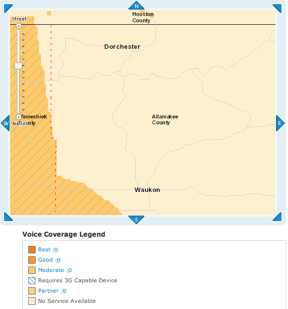
Reply comments are still open in this proceeding. vox populi, vox dei
Current ATT coverage in rural Iowa
UPDATE
FCC’s Australian counterpart, Australian Communications and Media Authority/ACMA, has a new blog entry on “Removing jammers from the streets”. Included is the above video. ACMA says
Targeting prohibited devices has demanded an agile approach to compliance. Our activities also include preventative (education/awareness) and enforcement measures. This has helped to restrict the supply of jammers to the local market, forcing consumers to turn to online sources for devices that are often seized before reaching their destination.
The Australian penalties for unauthorized jammer marketing and use are much greater than in the US. For example the blog says:
There could be more substantial penalties, such as receiving a five-year prison sentence or penalty of up to $850,000 (5,000 penalty units) for causing substantial interference to radiocommunications used by emergency services (such as fire, police and ambulance) and other special organisations. And these aren’t the only penalties that could apply.
Note from the video that ACMA, unlike the US cellular interests, is clearly able to differentiate between authorized controlled jamming in prisons and unauthorized jamming that endangers public safety. Compare this with the following CTIA video which vilified both prison jamming and unauthorized jamming based on alleged experience in Brazil.
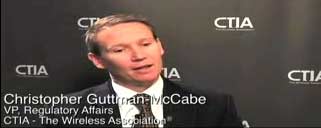
CTIA interview on prison jamming (June 2009)
UPDATE
Mr. Guttman-McCabe no longer works at CTIA and the interview on prison jamming discussed above has magically disappeared from the CTIA website. But there isn sign that CTIA's policy has changed at all.
On the Assassination of Colorado Corrections Chief Clements
Tom Clements 1955-2013

Yesterday Tom Clements, Executive Director of the Colorado Department of Corrections and a 32 year veteran of public service in the corrections area was assassinated at his home by an unknown party. This is sadly reminiscent of the attack on South Carolina Department of Corrections Captain Robert Johnson in March 2010 which is now known to have been ordered over an illicit cellphone operated in a prison.
(Capt. Johnson is now suing 20 cellular industry firms on the issue of whether they were aware of the illicit calls from the prison where he worked but chose instead “to facilitate this illegal activity.” The firms being sued are American Towers, LLC; Farmer Telephone Cooperative Inc.; Cellco Telephone Co. of the Southeast, LLC; Cellco Partnership d/b/a Verizon Wireless; Sprint Cellular Co. of South Carolina; Sprint Communications Co., L.P.; Alltel Communications, LLC; Alltel Communications, Inc.; Alltel Mobile Communications of South Carolina Inc.; T-Mobile USA Tower LLC; T-Mobile USA Inc.; ATT&T Inc.; AT&T Mobility LLC; Verizon Wireless, LLC; Verizon Wireless Service LLC; Verizon Wireless of the East, L.P.; and Tracfone Wireless, Inc.)
I recall a meeting among FCC staffers maybe a decade ago where a colleague, who has since left FCC, wondered why a manager in another part of FCC was so upset about something she said. She commented that “all we do is economic regulations” so it wasn’t “worth getting emotional about”. Well, much of what FCC does is probably “economic regulation” like local zoning and in some way determines who gets more money than another party. But Section 1 of the Communications Act also charges FCC to deal with “promoting safety of life and property through the use of wire and radio communications” and some FCC actions have life and death consequences.
It is too soon to tell for sure if the Clements assassination was connected with illicit cell phone use, but if I was Mitt Romney I would bet $10,000 that it was.
FCC now has in its “inbox” at least 3 petitions dealing with the cellphone in prisons issue that it has not acted on:
- CTIA’s November 2007 petition (Part of this petition not related to prisons was finally addressed in Docket 10-4, but the prison related issues have never been even put out for public comment)
- South Carolina Department of Corrections August 2009 petition (Signed by 30 other state and local corrections agencies)
- GTL July 2011 petition - This petition has disappeared into FCC’s petition “black hole” and is not available on the FCC’s voluminous website which promises “transparency”. However, GTL has provided us with a copy so we can make it available here. (MSS contributed to the drafting of this petition as well as the South Carolina petition. However, no present MSS clients are involved in this issue.)
Chairman Genachowski, these petitions come from a variety of parties - including a major trade association, state governments and a small company - and advocate a variety of actions - some of which are mutually inconsistent.
Isn’t it time to act on this urgent public safety issue and clarify FCC policy by dealing with these petitions one way or another?
UPDATE
No proof yet that this event was cellphone related, but it apparently also occurred to ABC News which posted a story entitled “Prison Chief's Death Highlights Safety Concerns” Here is a section:
Correctional professionals interviewed in the aftermath of the Colorado shooting say the growing influence of prison gangs, their ability to communicate with affiliates on the outside through smuggled cellphones and the ease with which people can be found and tracked online have made the job even more dangerous for them and their families.”
CTIA, why don’t we agree to both ask FCC to act one way or other on these pending petitions, including one of yours, that are gathering dust as people die.
UPDATE 2
Here is the new story about the murder of 2 prosecutors in 2 months in a rural county of Texas. District Attorney Mike McLelland and his wife, Cynthia were found murdered at their home on March 30. Assistant District Attorney Mark Hasse was killed on his way to work in January. Note that the McLelland case MO was they same as in the Clements case and the Johnson case. That does not prove that illicit cellphone use was a factor, but if I was Mitt Romney …
California Report on Prison Cell Phone Use Issues
As of July 2008, seventy-six members and fellows are also members of the National Academies, six are Nobel laureates, nine are National Medal of Science recipients and two are recipients of the National Medal of Technology.
CTIA and the major cellular carriers believe that Section 333 of the Communications Act precludes FCC from authorizing jamming of cellular communications by private sector or state or local government officials. The meaning of Section 333 has been a recurring topic here. While NTIA appears to agree with the cellular industry in this interoperation of the section, it appears that FCC has never made an en banc finding on this interpretation of the law although it is clear that under present FCC rules jamming is not authorized.
The CCST report describes managed access as:
“The Managed Access System (MAS) refers to a standard cell phone network system used in a defined close quarter geographic area such as a campus, military base or a prison. The theory behind MAS is to allow authorized cell phones to connect to the standard carrier (e.g. AT&T, Sprint, T-Mobile,Verizon) networks, while preventing unauthorized cell phones from connecting to the carrier networks. A well-designed and implemented MAS would function as a system to detect and preclude the operation of cell phones not authorized in the MAS approved database.”
CTIA and NTIA both feel that “managed access” is an effective technology for controlling cell phone use in prisons and the resulting threat to public safety. The CTIA website has the quote shown at left clearly describes managed access as “proven technology”. However, the December 2010 NTIA repot mandated by Congress does not go as far as CTIA does in saying that managed access is “proven”. NTIA merely states that “Managed access technologies hold promise as a solution” (p. 37) and that “(t)he technology requires close coordination with the FCC and wireless carriers”. NTIA also raised questions about the cost of managed access.
In contrast to CTIA’s confidence in managed access and NTIA’s optimism, CCST finds
“(T)he Managed Access System (MAS) technology of today is not mature enough for immediate large-scale deployments such as that proposed by CDCR at California’s 33 state prisons.”(p.6)
Readers who followed the Linkedin Spectrum Experts group discussion on the NTIA report may recall that Australia’s Barry Matson suggested the solution may be putting the burden on the cell operators to not connect calls from cell phones in prisons. The report independently comes to a similar suggestion:
The CCST Project Team recommends that potentially useful technology approaches be explored in confined prison areas, and that cell phone carriers be engaged to explore options of denying connections for ‘unregistered’ cell phones within prison locations using the carriers’ technology. In this latter case, identity of illegal cellular phones could be obtained via a benchmarking technology and the carrier could then deny cellular connection to the specific unregistered devices. Engaging the carriers would likely require either a legal requirement to participate or an income incentive via fee for participation. With the recent agreement of cell phone carriers with the federal government to disable services on stolen cell phones, this approach should be explored.
But even if managed access is ever to be used on a large scale it needs a better policy foundation than FCC just condoning its use. Successful managed access requires both the active participation of all the cellular carriers near a prison and detailed coordination of any technical changes to the cellular network including introduction of changes in the physical layer of the RF signal as well as new services. A successfully operating managed access system can become useless overnight and endanger public safety if one of the cellular systems in the area has an unanticipated technical change. While the major cellular carriers have indicated a willingness to accept managed access systems and sign agreements with prison authorities, they have never stated that would coordinate all technical changes and delay them as necessary until the managed access systems were upgraded. In addition, the 4 major cellular carriers are not the only carriers in the country, especially int he rural areas where maximum security prisons are often located. Indeed, future cellular auctions could well result in more corporate diversity. CCST finds
“A coordinated effort of several states to petition the FCC to modify existing spectrum owners’ agreements to require they provide unobstructed use of their spectrum within the geospatial confines of corrections facilities would be an important modification of regulations. If this effort is undertaken, the discussions could also include the possibility of using jamming technologies in some conditions.”
While the mainstream cellular industry is enthusiastic about managed access because it may allow jamming to be kept in Pandora’s Box, they have never taken a more positive step to build the policy infrastructure needed to give managed access a fair chance of success, whether or not that is really possible in the technical sense.
Petition Filed to Stop Contraband Cellphone Use in Prisons
The topic of illicit cellphone use in prisons has been a recurring topic here even though there has been no explicit FCC action on the topic other than a workshop almost a year ago. Indeed, while FCC waited over 2 years to ask for any public comment on CTIA’s November 2, 2007 petition on cellphone jamming and customer-owned bidirectional amplifiers, it has so far ignored all the jamming issues in that petition - both prison-related and otherwise. (The Docket 10-4 public notice seeking comment on this and other petitions avoids all mention of jamming issues of any type and focuses solely on the amplifier section of the petition.) But FCC is being somewhat even handed here: They have ignored both CTIA’s attempt to have all jammers declared illegal and the July/August 2009 petition of the South Carolina Department of Corrections and 30 other states to allow jamming in prisons to control illicit cellphone use. Except for the above mentioned workshop, FCC has taken no visible action to control cell phone use in prisons. (Of course, being caught between the powerful CTIA and state governments is not a desirable place to be.)

Carl Lackl, Jr. (l) a Baltimore witness murdered as a result of a prison cell phone call.
Capt. Robert Johnson (r) South Carolina Department of Corrections, shot 6 times
at his home as a result of a prison cell phone call.
The GTL petition addresses both jamming and “managed access” - interception and blocking of calls based on their location and possibly with a “green list” of cellphones that may make calls at or near prison property. The petition states,
“Managed access systems are generally favorably viewed, yet they are too costly for most deployments and complicated to authorize given the need to negotiate spectrum sublease agreements with multiple wireless telecommunications carriers. This petition presents a proposal to amend the Commission’s rules to streamline the spectrum lease process so that spectrum lease agreements, when needed, are obtained in a shorter period of time.”
It also seeks to clarify the obligations of a managed access system with respect to E-911 services and involve the local PSAP operator in determining what is appropriate for a given area.
Finally it asks the Commission to finally act on determining whether CTIA’s interpretation of Section 333 (that the Commission does not have the authority to permit jamming by non-federal entities) is consistent with the statute. It argues that FCC should consider the legislative history of Section 333 as well as the plain reading of the Communications Act that whatever Section 333 means it must apply equally to both FCC and NTIA since it does not differentiate between the two agencies. (Section 305 exempts the President and NTIA from Sections 301 and 303, but not from the rest of the Communications Act. Also, Section 333’s contemporary on satellite jamming, 18 USC 1367, specifically excludes “any lawfully authorized investigative, protective, or intelligence activity of a law enforcement agency or of an intelligence agency of the United States” while Section 333 is silent on this point.)
Let’s hope that FCC finds this petition in its inbox and takes some action on this important issue that has been ignored for so long. Sources in FCC report that there is no centralized tracking of petitions that are received but have not been put out for public notice. So even the 8th Floor may not be aware of this petition and its issues.
UPDATE
On 9/6 CellAntenna Corporation filed a related petition with FCC. So FCC now has 3 petitions dealing with various aspects of contraband cellphone use in prisons, ALL without any action.
The CellAntenna petition would “require CMRS carriers to do their part and suspend service to any wireless device reported to be operating in a correctional facility within one hour after receipt of notice from a Warden”. Of course, this approach could allow any smuggled cellphone to be used at least once and would be a boon to contraband smugglers.
So isn’t it time for FCC to at least put some of these petitions on public notice for comment?
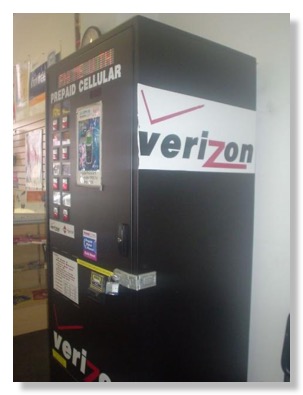
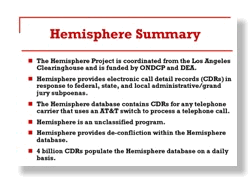

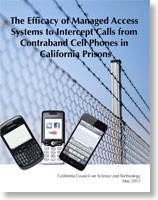
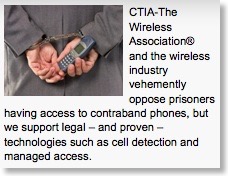
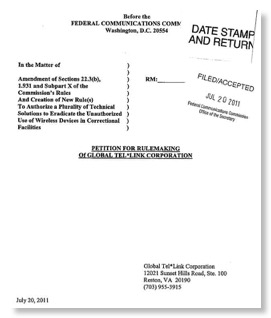



![Validate my RSS feed [Valid RSS]](valid-rss-rogers.png)

